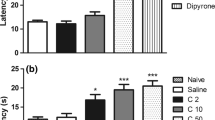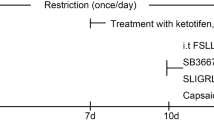Abstract.
Objective and Design: Zymosan-induced peritoneal inflammation is significantly inhibited in mice injected with an irritant supplemented with morphine. The aim of the present study was to examine the putative mast cell involvement in this inhibition. Subjects: Peritonitis was induced in WBB6F1 mice (genetically mast cell-deficient W/Wv and their control littermaters +/+) and in Balb/c mice, with normal mast cells (MC) and mast cell-depleted (MCx) by pretreatment with compound 48/80. Bone marrow leukocytes from intact Balb/c mice were tested for their sensitivity to chemoattractants after in vitro incubation with morphine (10-6M), with or without preincubation with naltrexone (10-8M). Control cells were incubated in medium only. Treatment: Peritonitis was induced by i.p. injection of either zymosan only (Z, 2 mg/ml) or zymosan supplemented with morphine (ZM, M: 20 mg/kg), without or with pretreatment with naltrexone (NZM, N: 5 mg/kg). Methods: Thirty minutes after induction of peritonitis, the histamine levels (ELISA) and vascular permeability (Evans blue leakage) were measured. At 6 h, the number of exudatory leukocytes (haemocytometer) and chemotaxis/chemoattractant level (48-well chemotactic chamber) were estimated. Results: (1) At 6 h of peritonitis, the number of exudatory leukocytes and levels of plasma chemoattractants were significantly lower in animals injected with zymosan supplemented with morphine (ZM) than in Z and NZM groups of WBB6F1 and Balb/c mice, but only in those with normal mast cells, and not in their mast cell-deficient/depleted counterparts. (2) In contrast, at 30 minutes, vascular permeability and histamine levels were higher in ZM than in Z group of mice with normal mast cells (MC), but not in those depleted of mast cells (MCx). (3) In vitro preincubation of leukocytes with morphine inhibited their migratory activity only towards peritoneal fluid from zymosan-treated MC mice but not from their MCx counterparts. Conclusions: Mast cell-derived factors are involved in morphine-mediated impairment of zymosan-induced peritonitis in mice.
Similar content being viewed by others
Author information
Authors and Affiliations
Additional information
Received 13 December 2000; returned for revision 6 April 2001; accepted by I. Ahnfeld-Rønne 4 May 2001
Rights and permissions
About this article
Cite this article
Kolaczkowska, E., Seljelid, R. & Plytycz, B. Critical role of mast cells in morphine-mediated impairment of zymosan-induced peritonitis in mice. Inflamm. res. 50, 415–421 (2001). https://doi.org/10.1007/PL00000264
Issue Date:
DOI: https://doi.org/10.1007/PL00000264




